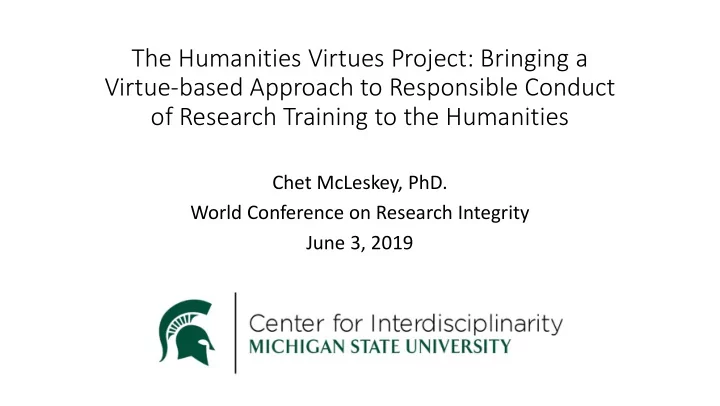

The Humanities Virtues Project: Bringing a Virtue ‐ based Approach to Responsible Conduct of Research Training to the Humanities Chet McLeskey, PhD. World Conference on Research Integrity June 3, 2019
The Larger Project • Develop a curriculum using a virtue theoretic framework • Focus on dispositions (virtues) to act appropriately rather than a series of rules to follow • Ask ‘what is it to be an excellent researcher/scholar?’ • Different fields and disciplines may have different views on excellence and the dispositions that support it. • Incorporate traditional RCR training tools into our larger framework • Use the virtue schema to reframe RCR and research ethics issues • Starting with workshops on the virtues with further developments to come
Started with Science and a Toolbox • Toolbox Dialogue Initiative • Philosophically infused dialogues • Prompts used to initiate discussion and reveal underlying assumptions and differences in definitions/conceptions • 300+ workshops nationally and internationally • Adapted in light of the Scientific Virtues Project • Modules designed around virtues and RCR concepts • Moderated more directly due to pedagogical needs • ‘Socrates in the room’ • 50+ workshops to date
The Workshops • Aim to help participants connect practices with the values that inform those practices. • Discussion prompts range from abstract (e.g. the nature of discipline/field) to concrete (RCR concerns). • Interactions with other scholars reveal nuances of ethical situations. • Offer opportunities to develop skills and familiarity in discussing ethically complex (and in some cases sensitive) issues. • Helps at both the individual level as well as the cultural level. • Tie proper action to the values inherent in the discipline • Motivation from within
The Humanities Virtues Project • Humanities remain underserved in RCR • MSU mandates that all graduate students receive RCR training • MSU looking at culture change on campus • Virtues projects as ‘dual purpose’ – helping with RCR instruction and developing a culture that supports open discussion • Not simply dropping a science model onto humanists • Working with departments to tailor workshops • Build on what we have learned in science to develop a model that works for humanists
The Humanities Virtues Project • Graduate students from across college together in one discussion • Philosophy; Art, Art History, and Design; Writing, Rhetoric, and American Cultures; English; Theatre; Romance and Classical Studies; Religious Studies; Linguistics and Germanic, Slavic, Asian, and African Languages • Prompts aimed at what it means to be an excellent researcher in humanities disciplines. • Participants encouraged to discuss similarities and differences among their viewpoints. • Moderator can play Socratic role when needed. • Six 3 ‐ hour workshops held this year, with an avg. 4 ‐ 5 participants.
What we are seeing… preliminarily • Humanists tend to see RCR as a ‘science thing’, but embrace the focus on excellence in research. • Graduate students greatly prefer discussion ‐ based training. • Participants benefit from encounters with other disciplines. • Moral perception/sensemaking • Logical consequence and aporía • Both similarities and differences between humanists and scientists • Different manifestations of the same values/virtues • Participants reflect on the discussions after workshops are over. • Graduate students appreciate spaces to be naïve.
Future directions… • Expand and refine humanities modules. • Develop prompts for specific virtues • Introduce more RCR topics • Explore new modes of assessment based on our theoretical framework. • Philosophy and psychology of action • Use what we have learned to expand to other domains • Currently in talks with 4 other colleges within MSU • Continue working with the Graduate School at MSU to make RCR and research ethics a part of the broader graduate curriculum.
Acknowledgements The Team: Eric Berling, Michael O’Rourke, and Robert T. Pennock. Special thanks to Bill Hart ‐ Davidson.
Recommend
More recommend